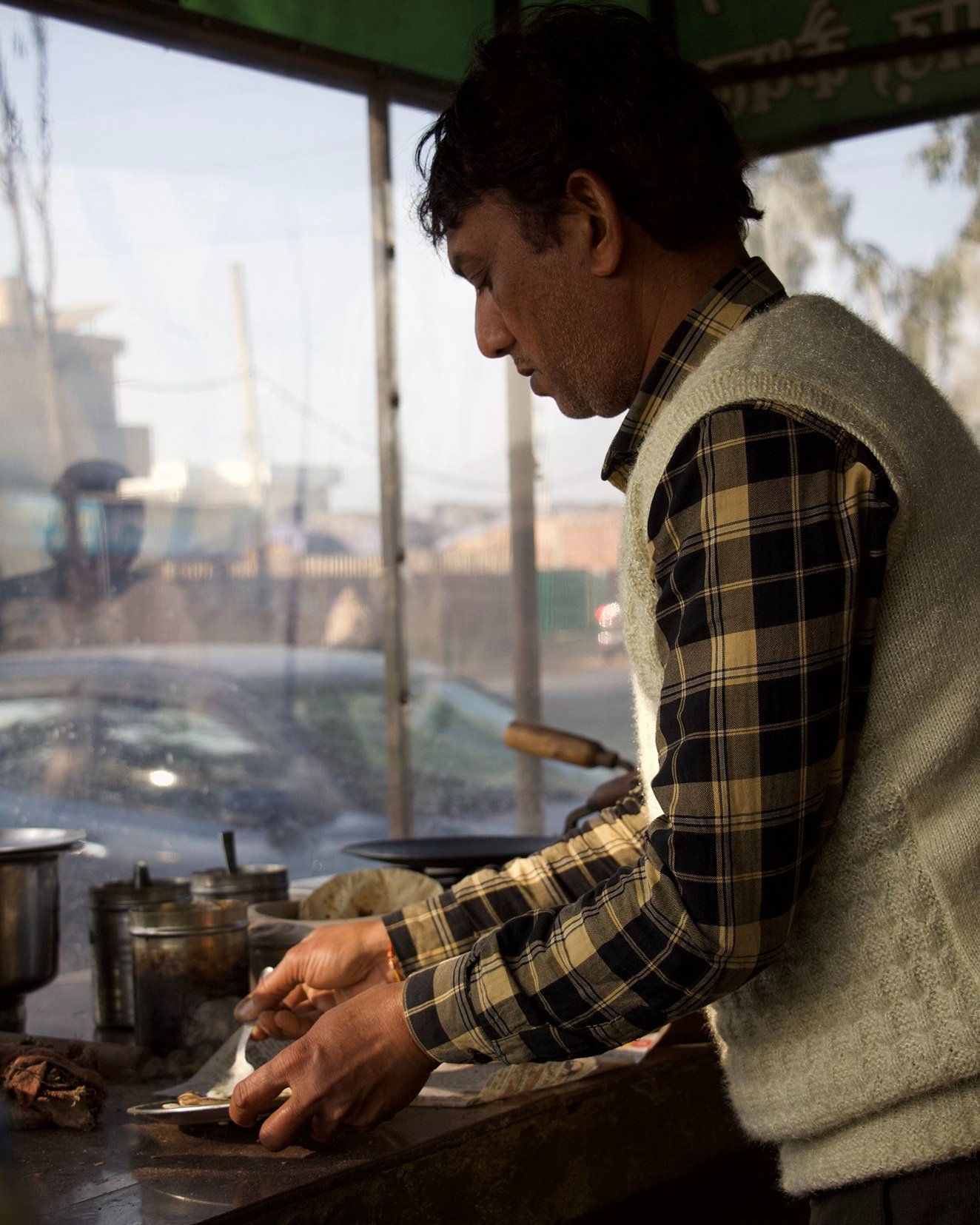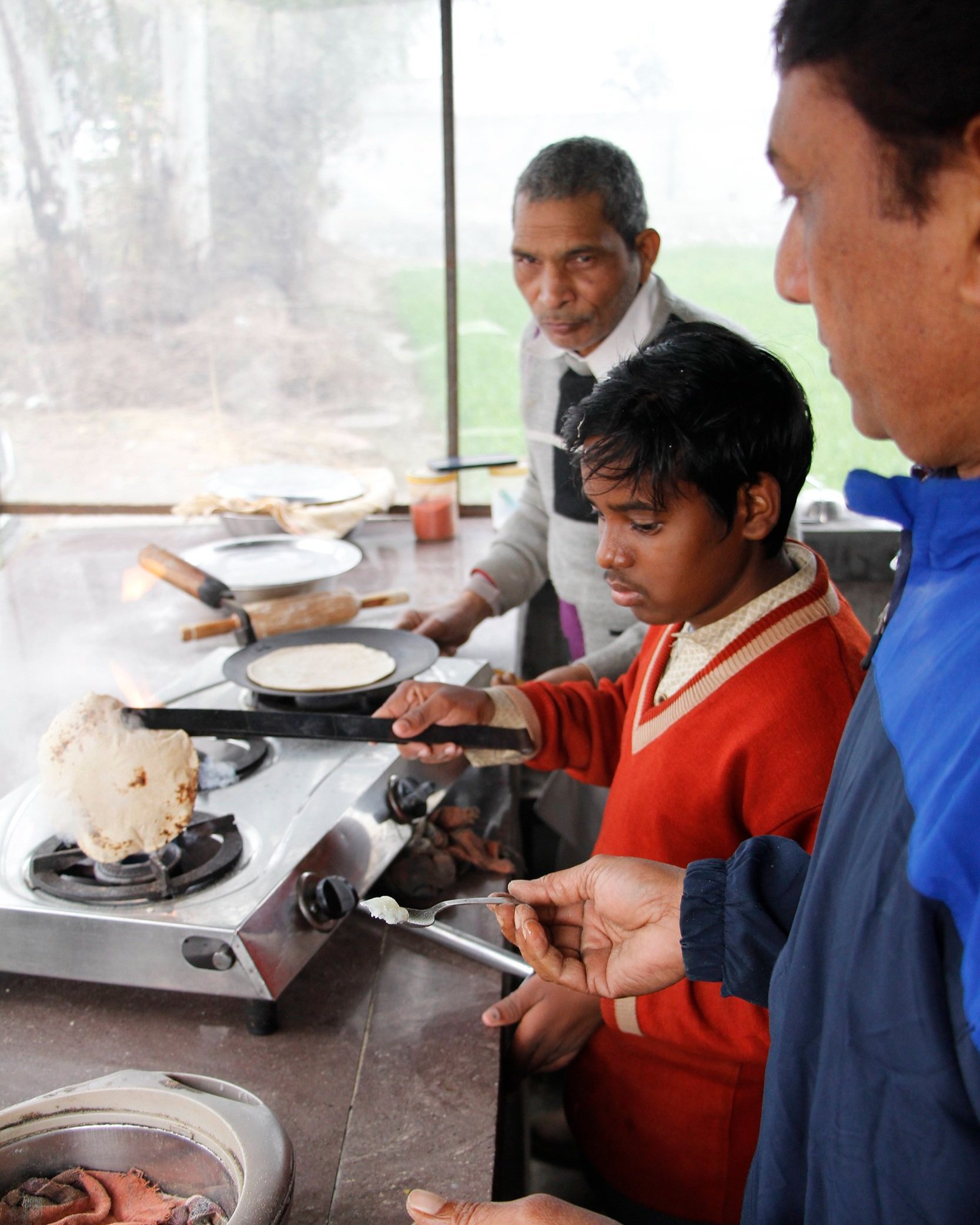Family serving family
The 2020 farmers’ protest led to the founding of the non-profit Kisan Mazdoor Canteen in Kaithal, Haryana to serve community members.
By Abbi Bates
Arun, 16, works and lives at the canteen. He makes naan for the incoming customers in Haryana, India, Jan. 16. After leaving his family for a better place and life, Vikram Singh took Arun in over a year ago to give him a stable job, food, clothes and a roof over his head. | Photo by
Emma Carmichael
Arun Kumar stands with Karan Singh in the kitchen buttering roti and stirring dahl. Dirty dishes stack up behind them during the lunch rush. Vikram Singh greets hungry customers in the middle of their long workday. They are welcomed with a warm plate of local food that shows they are supported and valued despite the harsh conditions of most of their workplaces.
But this gathering place didn’t always stand. The canteen, Vikram says, is a product of hard work, commitment and the 2020 farmers’ protest throughout India, which had defining moments at this stop on this farm-lined highway between Kaithal and Delhi.
The protests started in response to the passing of three farm acts by the parliament of India. The main concern of farmers was that income from crops would decrease as a result of a deregulated system by a government-run wholesale market. The goal of the protest was to revocate the three laws and have minimum support prices guaranteed by the government. After more than a year of protests, the government relented on both.
As community members of Haryana and other neighboring states participated in protests, local community organizers began to brainstorm ways to serve and support protestors.
Jagbir “Jagga” Kundu belongs to a family that contributed to the village of Titram’s desire for social justice. His father wanted to make India a place for everyone to have freedom. As a leader of the Titram District for the farmers’ protest, he asked: “What can we do for our people of India?”
This is where the idea of the canteen sparked.
Photo by Sebastian Studier
The canteen was formed for protestors to have food and water during encirclements, sit-ins and traffic obstructions during the fight. Now, the building stands as a way to serve local farmers, migrant workers and labor-class employees by providing them with healthy food and water for all three meals of the day at minimum or no cost.
Vikram was at a restaurant next to the canteen when he met Arun. At the time, 15-year-old Arun was sick with a fever, cough and cold. Vikram hired him as one of his employees at the canteen. But now, Vikram says he sees Arun as a son.
Arun had been a migrant worker in Haryana from Bihar, a 21-hour drive east, where jobs — even bad ones — aren’t as available as they are in Haryana. He previously worked at a rice factory across the street from the canteen. He says the job left him hungry and sick.
“A kid with this kind of honesty shouldn’t spoil his life working in these kinds of conditions,” Vikram said.
Now, Arun grins as he welcomes visitors and regulars into the canteen.
“Arun is a very pure-hearted, honest child,” Jagga said.
Three men run the canteen: Amit Kumar, Jagga and Vikram. Amit donated his land, a field right off of the main road between Kaithal and Titram village. Vikram manages the cooking, cleaning and deliveries. Jagga helps defend the canteen’s mission and is quick to serve food and flip roti or bus stainless steel plates. A dozen active Titram volunteers provide financial and in-house support to the canteen.
Vikram’s wife works out of his house, which is their only source of income. She supports his mission to serve local farmers, migrant workers and laborers despite the financial instability it causes at times, he said.
Scents of ginger from chai and pepper from masala drift into the air. Storage shelves line the wall with stacks of chai mugs, stainless steel cookware and dry lentils in laundry detergent containers. Green tarps draped over the dining room are structured with bamboo poles. The walk-up window is filled with Vikram’s smile and a “How many people?” or a “What can I get for you? Take a seat!”
Behind the dining room is a common space for gathering, warming hands over the small bowled pitted fire and taking a hit of hookah while sitting on woven cots.
Arun and Karan earn a living from the canteen. The two share a roti assembly line as Karan rolls out the dough and Arun cooks, flips and crisps to taste over a flame. They rarely look up through the plexiglass toward the main road at tractors pulling house-sized piles of hay, government buses blaring horns and tuk-tuks or motorcycles weaving around both.
The canteen keeps its meals consistent and nutritious. Arun’s favorite canteen-classic dish is dahl — a side dish made of dried split pulses like lentils, peas and beans cooked with jalapeños and onions. The canteen serves 40 to 60 daily, more during peak farming season.
Vikram helps Arun during the lulls of the day to study Hindi sentences and English letters using word cards and basic language books. Arun dreams of being a teacher and studying in the United States.
Arun loves the environment of the canteen, as adult men from Titram mentor him emotionally and relationally. But they also help him with more practical things, like his laundry.
“I have a family here. They might be older guys, but they will still play football with me,” Arun said.
Jagga hopes to make the gathering space a foundation that inspires social change in the future. They have no plans of using future profits to pay other members. Jagga would rather use profits for things like building other canteens or contributing to children’s education and cultural activities.
“Our canteen may be small, but our hearts are big,” Vikram said.




